| Home | Previous Part | Main Index | Next Part |
THE DORE GALLERY OF BIBLE ILLUSTRATIONS
By Gustave Dore
Volume 2.


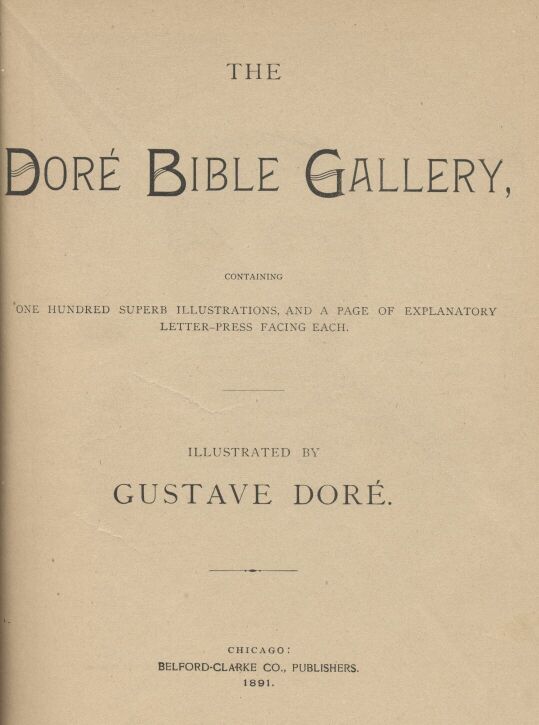
This volume, as its title indicates, is a collection of engravings illustrative of the Bible—the designs being all from the pencil of the greatest of modern delineators, Gustave Dore. The original work, from which this collection has been made, met with an immediate and warm recognition and acceptance among those whose means admitted of its purchase, and its popularity has in no wise diminished since its first publication, but has even extended to those who could only enjoy it casually, or in fragmentary parts. That work, however, in its entirety, was far too costly for the larger and ever-widening circle of M. Dore's admirers, and to meet the felt and often-expressed want of this class, and to provide a volume of choice and valuable designs upon sacred subjects for art-loving Biblical students generally, this work was projected and has been carried forward. The aim has been to introduce subjects of general interest—that is, those relating to the most prominent events and personages of Scripture—those most familiar to all readers; the plates being chosen with special reference to the known taste of the American people. To each cut is prefixed a page of letter-press—in, narrative form, and containing generally a brief analysis of the design. Aside from the labors of the editor and publishers, the work, while in progress, was under the pains-taking and careful scrutiny of artists and scholars not directly interested in the undertaking, but still having a generous solicitude for its success. It is hoped, therefore, that its general plan and execution will render it acceptable both to the appreciative and friendly patrons of the great artist, and to those who would wish to possess such a work solely as a choice collection of illustrations upon sacred themes.
GUSTAVE DORE.
The subject of this sketch is, perhaps, the most original and variously gifted designer the world has ever known. At an age when most men have scarcely passed their novitiate in art, and are still under the direction and discipline of their masters and the schools, he had won a brilliant reputation, and readers and scholars everywhere were gazing on his work with ever-increasing wonder and delight at his fine fancy and multifarious gifts. He has raised illustrative art to a dignity and importance before unknown, and has developed capacities for the pencil before unsuspected. He has laid all subjects tribute to his genius, explored and embellished fields hitherto lying waste, and opened new and shining paths and vistas where none before had trod. To the works of the great he has added the lustre of his genius, bringing their beauties into clearer view and warming them to a fuller life.
His delineations of character, in the different phases of life, from the horrible to the grotesque, the grand to the comic, attest the versatility of his powers; and, whatever faults may be found by critics, the public will heartily render their quota of admiration to his magic touch, his rich and facile rendering of almost every thought that stirs, or lies yet dormant, in the human heart. It is useless to attempt a sketch of his various beauties; those who would know them best must seek them in the treasure—house that his genius is constantly augmenting with fresh gems and wealth. To one, however, of his most prominent traits we will refer—his wonderful rendering of the powers of Nature.
His early wanderings in the wild and romantic passes of the Vosges doubtless developed this inherent tendency of his mind. There he wandered, and there, mayhap, imbibed that deep delight of wood and valley, mountain—pass and rich ravine, whose variety of form and detail seems endless to the enchanted eye. He has caught the very spell of the wilderness; she has laid her hand upon him, and he has gone forth with her blessing. So bold and truthful and minute are his countless representations of forest scenery; so delicate the tracery of branch and stem; so patriarchal the giant boles of his woodland monarchs, that the' gazer is at once satisfied and entranced. His vistas lie slumbering with repose either in shadowy glade or fell ravine, either with glint of lake or the glad, long course of some rejoicing stream, and above all, supreme in a beauty all its own, he spreads a canopy of peerless sky, or a wilderness, perhaps, of angry storm, or peaceful stretches of soft, fleecy cloud, or heavens serene and fair—another kingdom to his teeming art, after the earth has rendered all her gifts.
Paul Gustave Dore was born in the city of Strasburg, January 10, 1833. Of his boyhood we have no very particular account. At eleven years of age, however, he essayed his first artistic creation—a set' of lithographs, published in his native city. The following year found him in Paris, entered as a 7. student at the Charlemagne Lyceum. His first actual work began in 1848, when his fine series of sketches, the "Labors of Hercules," was given to the public through the medium of an illustrated, journal with which he was for a long time connected as designer. In 1856 were published the illustrations for Balzac's "Contes Drolatiques" and those for "The Wandering Jew "—the first humorous and grotesque in the highest degree—indeed, showing a perfect abandonment to fancy; the other weird and supernatural, with fierce battles, shipwrecks, turbulent mobs, and nature in her most forbidding and terrible aspects. Every incident or suggestion that could possibly make the story more effective, or add to the horror of the scenes was seized upon and portrayed with wonderful power. These at once gave the young designer a great reputation, which was still more enhanced by his subsequent works.
With all his love for nature and his power of interpreting her in her varying moods, Dore was a dreamer, and many of his finest achievements were in the realm of the imagination. But he was at home in the actual world also, as witness his designs for "Atala," "London—a Pilgrimage," and many of the scenes in "Don Quixote."
When account is taken of the variety of his designs, and the fact considered that in almost every task he attempted none had ventured before him, the amount of work he accomplished is fairly incredible. To enumerate the immense tasks he undertook—some single volumes alone containing hundreds of illustrations—will give some faint idea of his industry. Besides those already mentioned are Montaigne, Dante, the Bible, Milton, Rabelais, Tennyson's "Idyls of the King," "The Ancient Mariner, Shakespeare, "Legende de Croquemitaine," La Fontaine's "Fables," and others still.
Take one of these works—the Dante, La Fontaine, or "Don Quixote"—and glance at the pictures. The mere hand labor involved in their production is surprising; but when the quality of the work is properly estimated, what he accomplished seems prodigious. No particular mention need be made of him as painter or sculptor, for his reputation rests solely upon his work as an illustrator.
Dore's nature was exuberant and buoyant, and he was youthful in appearance. He had a passion for music, possessed rare skill as a violinist, and it is assumed that, had he failed to succeed with his pencil, he could have won a brilliant reputation as a musician.
He was a bachelor, and lived a quiet, retired life with his mother—married, as he expressed it, to her and his art. His death occurred on January 23, 1883.
THE TRIAL OF THE FAITH OF ABRAHAM.
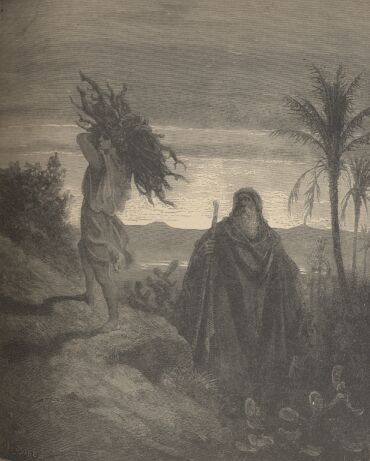
And it came to pass after these things, that God did tempt Abraham, and said unto him, Abraham: and he said, Behold, here I am. And he said, Take now thy son, thine only son Isaac, whom thou lovest, and get thee into the land of Moriah; and offer him there for a burnt offering upon one of the mountains which I will tell thee of.
And Abraham rose up early in the morning, and saddled his ass, and took two of his young men with him, and Isaac his son, and clave the wood for the burnt offering, and rose up and went unto the place of which God had told him. Then on the third day Abraham lifted up his eyes and saw the place afar off. And Abraham said unto his young men, Abide ye here with the ass; and I and the lad will go yonder and worship, and come again to you. And Abraham took the wood of the burnt offering and laid it upon Isaac his son; and he took the fire in his hand and a knife, and they went both of them together. And Isaac spake unto Abraham his father, and said, My father: and he, said, Here am I, my son. And he said, Behold the fire and the wood: but where is the lamb for a burnt offering? And Abraham said, My son, God will provide himself a lamb for a burnt offering: so they went both of them together. And they came to the place which God had told him of; and Abraham built an altar there, and laid the wood in order, and bound Isaac his son, and laid him on the altar upon the wood. And Abraham stretched forth his hand and took the knife to slay his son. And the angel of the Lord called unto him out of heaven, and said, Abraham, Abraham: and he said, Here am I. And he said, Lay not thine hand upon the lad, neither do thou anything unto him: for now I know that thou fearest God, seeing thou hast not withheld thy son, thine only son, from me. And Abraham lifted up his eyes and looked, and behold behind him a ram caught in a thicket by his horns: and Abraham went and took the ram, and offered him up for a burnt offering in the stead of his son.
And Abraham called the name of that place Jehovah-jireh: as it is to this day, In the mount of the Lord it shall be seen.
And the angel of the Lord called unto Abraham out of heaven the second time, and said, By myself have I sworn, saith the Lord, for because thou hast done this thing, and hast not withheld thy son, thine only son, that in blessing I will bless thee, and in multiplying I will multiply thy seed as the stars of heaven, and as the sand which is upon the sea shore; and thy seed shall possess the gate of his enemies; and in thy seed shall all the nations of the earth be blessed, because thou hast obeyed my voice.—Geneszs xxii. 1-18.
THE BURIAL OF SARAH.
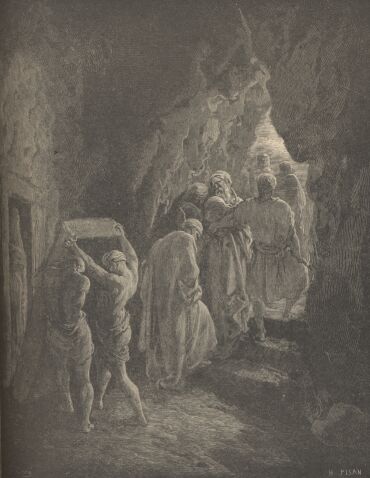
And Sarah was an hundred and seven and twenty years old these were the years of the life of Sarah. And Sarah died in Kirjath-arba; the same is Hebron in the land of Canaan and Abraham came to mourn for Sarah, and to weep for her.
And Abraham stood up from before his dead, and spake unto the sons of Heth, saying, I am a stranger and a sojourner with you: give me a possession of a burying-place with you, that I may bury my dead out of my sight.
And the children of Heth answered Abraham, saying unto him, Hear us, my lord: thou art a mighty prince among us: in the choice of our sepulchres bury thy dead; none of us shall withhold from thee his sepulchre, but that thou mayest bury thy dead.
And Abraham stood up, and bowed himself to the people of the land, even to the children of Heth. And he communed with them, saying, If it be your mind that I should bury my dead out of my sight; hear me, and intreat for me to Ephron the son of Zohar, that he may give me the cave of Machpelah, which he hath, which is in the end of his field; for as much money as it is worth he shall give it me for a possession of a burying-place amongst you.
And Ephron dwelt among the children of Heth: and Ephron the Hittite answered Abraham in the audience of the children of Heth, even of all that went in at the gate of his city, saying, Nay, my lord, hear me: the field give I thee, and the cave that is therein, I give it thee; in the presence of the sons of my people give I it thee: bury thy dead.
And Abraham bowed down himself before the people of the land. And he spake unto Ephron in the audience of the people of the land, saying, But if thou wilt give it, I pray thee, hear me: I will give thee money for the field; take it of me, and I will bury my dead there.
And Ephron answered Abraham, saying unto him, My lord, hearken unto me: the land is worth four hundred shekels of silver: what is that betwixt me and thee? bury therefore thy dead.
And Abraham hearkened unto Ephron; and Abraham weighed to Ephron the silver, which he had named in the audience of the sons of Heth, four hundred shekels of silver, current money with the merchant.
And the field of Ephron, which was in Machpelah, which was before Mamre, the field, and the cave which was therein, and all the trees that were in the field, that were in all the borders round about, were made sure unto Abraham for a possession in the presence of the children of Heth, before all that went in at the gate of his city.
And after this, Abraham buried Sarah his wife in the cave of the field of Machpelah before Mamre; the same is Hebron in the land of Canaan. And the field, and the cave that is therein, were made sure unto Abraham for a possession of a burying-place by the sons of Heth.—Genesis xxiii.
ELIEZER AND REBEKAH.
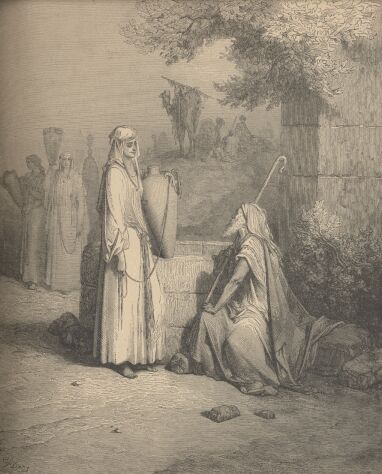
And the servant put his hand under the thigh of Abraham his master, and sware to him concerning that matter.
And the servant took ten camels of the camels of his master, and departed; for all the goods of his master were in his hand: and he arose and went to Mesopotamia, unto the city of Nahor. And he made his camels to kneel down, without the city by a well of water at the time of the evening, even the time that women go out to draw water. And he said, O Lord God of my master Abraham, I pray thee, send me good speed this day, and shew kindness unto my master Abraham. Behold, I stand here by the well of water; and the daughters of the men of the city come out to draw: water: and let it come to pass, that the damsel to whom I shall say, Let down thy pitcher, I pray thee, that I may drink; and she shall say, Drink, and I will give thy camels drink also: let the same be she that thou hast appointed for thy servant Isaac; and thereby shall I know that thou hast shewed kindness unto my master.
And it came to pass before he had done speaking, that, behold, Rebekah came out, who was born to Bethuel, son of Milcah, the wife of Nahor, Abraham's brother, with her pitcher upon her shoulder. And the damsel was very fair to look upon, a virgin, neither had any man known her: and she went down to the well, and filled her pitcher and came up. And the servant ran to meet her, and said, Let me, I pray thee, drink a little water of thy pitcher. And she said, Drink, my lord; and she hasted, and let down her pitcher upon her hand, and gave him drink. And when she had done giving him drink, she said, I will draw water for thy camels also, until they have done drinking. And she hasted and emptied her pitcher into the trough, and ran again unto the well to draw water, and drew for all his camels.
And the man wondering at her held his peace, to wit whether the Lord had made his journey prosperous or not.
And it came to pass, as the camels had done drinking, that the man took a golden earring of half a shekel weight, and two bracelets for her hands of ten shekels weight of gold: and said, Whose daughter art thou? tell me, I pray thee; is there room in thy father's house for us to lodge in? And she said unto him, I am the daughter of Bethuel the son of Milcah, which she bare unto Nahor. She said moreover unto him, We have both straw and provender enough, and room to lodge in.
And the man bowed down his head and worshiped the Lord. And he said, Blessed be the Lord God of my master Abraham, who hath not left destitute my master of his mercy and his truth: I being in the way, the Lord led me to the house of my master's brethren.
And the damsel ran, and told them of her mother's house these things.—Genesis xxiv, 9-28.
ISAAC BLESSING JACOB.
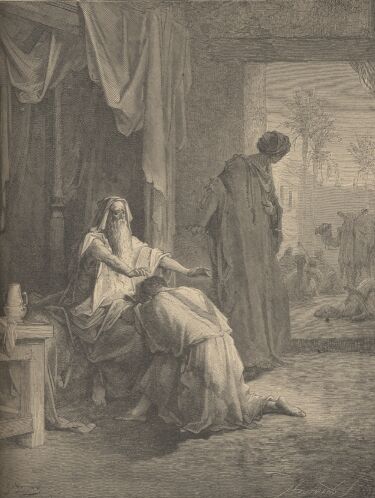
And it came to pass, that when Isaac was old, and his eyes were dim, so that he could not see, he called Esau, his eldest son, and said unto him, My son: and he said unto him, Behold, here am I. And he said, Behold now, I am old, I know not the day of my death: Now therefore take, I pray thee, thy weapons, thy quiver and thy bow, and go out to the field, and take me some venison; And make me savoury meat, such as I love, and bring it to me, that I may eat; that my soul may bless thee before I die.
And Rebekah heard when Isaac spake to Esau his son. And Esau went to the field to hunt for venison, and to bring it.
And Rebekah spake unto Jacob her son, saying, Behold, I heard thy father speak unto Esau thy brother, saying, Bring me venison, and make me savoury meat, that I may eat, and bless thee before the Lord before my death. Now therefore, my son, obey my voice according to that which I command thee. Go now to the flock, and fetch me from thence two good kids of the goats; and I will make them savoury meat for thy father such as he loveth; And thou shalt bring it to thy father, that he may eat, and that he may bless thee before his death.
And Jacob said to Rebekah his mother, Behold, Esau my brother is a hairy man, and I am a smooth man: My father peradventure will feel me, and I shall seem to him as a deceiver; and I shall bring a curse upon me, and not a blessing.
And his mother said unto him, Upon me be thy curse, my son: only obey my voice, and go fetch me them.
And he went, and fetched, and brought them to his mother: and his mother made savoury meat, such as his father loved. And Rebekah took goodly raiment of her eldest son Esau, which were with her in the house, and put them upon Jacob her younger son: And she put the skins of the kids of the goats upon his hands and upon the smooth of his neck: And she gave the savoury meat and the bread, which she had prepared, into the hand of her son Jacob.
And he came unto his father, and said, My father: and he said, Here am I; who art thou, my son? And Jacob said unto his father, I am Esau thy first born; I have done according as thou badest me: arise, I pray thee, sit and eat of my venison, that thy soul may bless me. And Isaac said unto his son, How is it that thou hast found it so quickly, my son? And he said, Because the Lord thy God brought it to me. And Isaac said unto Jacob, Come near, I pray thee, that I may feel thee, my son, whether thou be my very son Esau or not. And Jacob went; near unto Isaac his father; and he felt him, and said, The voice is Jacob's voice, but the hands are the hands of Esau. And he discerned him not, because his hands were hairy, as his brother Esau's hands: so he blessed him.
And he said, Art thou my very son Esau? And he said, I am. And he said, Bring it near to me, and I will eat of my son's venison, that my soul may bless thee. And he brought it near to him, and he did eat; and he brought him wine, and he drank. And his father Isaac said unto him, Come near now, and kiss me, my son. And he came near, and kissed him: and he smelled the smell of his raiment, and blessed him, and said, See, the smell of my son is as the smell of a field which the Lord hath blessed: Therefore God give thee of the dew of heaven, and the fatness of the earth, and plenty of corn and wine: Let people serve thee, and nations bow down to thee: be lord over thy brethren, and let thy mother's sons bow down to thee: cursed be every one that curseth thee, and blessed be he that blesseth thee.—Genesis xxvii. 1-29.
JACOB TENDING THE FLOCKS OF LABAN.
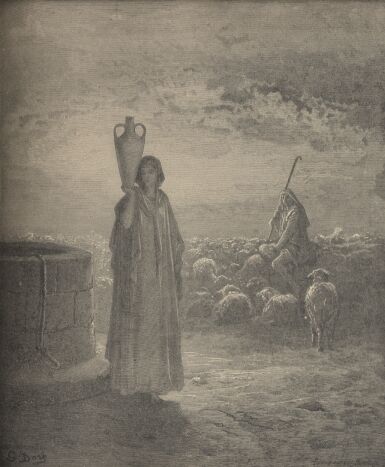
And while he yet spake with them, Rachel came with her father's sheep: for she kept them. And it came to pass, when Jacob saw Rachel the daughter of Laban his mother's brother, and the sheep of Laban his mother's brother, that Jacob went near, and rolled the stone from the well's mouth, and watered the flock of Laban his mother's brother. And Jacob kissed Rachel, and lifted up his voice, and wept. And Jacob told Rachel that he was her father's brother, and that he was Rebekah's son: and she ran and told her father.
And it came to pass, when Laban heard the tidings of Jacob his sister's son, that he ran to meet him, and embraced him, and kissed him, and brought him to his house. And he told Laban all these things. And Laban said to him, Surely thou art my bone and my flesh. And he abode with him the space of a month. And Laban said unto Jacob, Because thou art my brother, shouldest thou therefore serve me for naught? tell me, what shall thy wages be?
And Laban had two daughters: the name of the elder was Leah, and the name of the younger was Rachel. Leah was tender eyed; but Rachel was beautiful and well favoured.
And Jacob loved Rachel; and said, I will serve thee seven years for Rachel thy younger daughter. And Laban said, It is better that I give her to thee, than that I should give her to another man; abide with me.
And Jacob served seven years for Rachel; and they seemed unto him but a few days, for the love he had for her. And Jacob said unto Laban, Give me my wife, for my days are fulfilled, that I may go in unto her.
And Laban gathered together all the men of the place, and made a feast. And it came to pass in the evening, that he took Leah his daughter, and brought her to him; and he went in unto her. And Laban gave unto his daughter Leah Zilpah his maid, for an handmaid. And it came to pass that in the morning, behold, it was Leah: and he said to Laban, What is this thou hast done unto me? did not I serve with thee for Rachel? wherefore then hast thou beguiled me? And Laban said, It must not be so done in our country, to give the younger before the firstborn. Fulfil her week, and we will give thee this also for the service which thou shalt serve with me yet seven other years.
And Jacob did so, and fulfilled her week; and he gave him Rachel his daughter to wife also. And Laban gave to Rachel his daughter Bilhah his handmaid to be her maid. And he went in also unto Rachel, and he loved also Rachel more than Leah, and served with him yet seven other years.—Genesis xxix, 9-30.
JOSEPH SOLD INTO EGYPT.
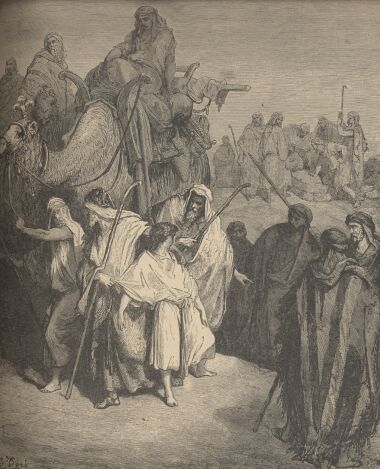
These are the generations of Jacob. Joseph, being seventeen years old, was feeding the flock with his brethren, and the lad was with the sons of Bilhah and with the sons of Zilpah, his father's wives; and Joseph brought unto his father their evil report. Now Israel loved Joseph more than all his children, because he was the son of his old age; and he made him a coat of many colors. And when his brethren saw that their father loved him more than all his brethren, they hated him, and could not speak peaceably unto him.
And Joseph dreamed a dream, and he told it his brethren: and they hated him yet the more. And he said unto them, Hear, I pray you, this dream which I have dreamed. For, behold, we were binding sheaves in the field, and, lo, my sheaf arose, and also stood upright; and, behold, your sheaves stood round about, and made obeisance to my sheaf. And his brethren said to him, Shalt thou indeed reign over us? or shalt thou indeed have dominion over us? And they hated him yet the more for his dreams and for his words.
And he dreamed yet another dream, and told it his brethren, and said, Behold, I have dreamed a dream more; and, behold, the sun and the moon and the eleven stars made obeisance to me. And he told it to his father and to his brethren; and his father rebuked him, and said unto him, What is this dream that thou hast dreamed? Shall I and thy mother and thy brethren indeed come to bow down ourselves to thee to the earth. And his brethren envied him; but his father observed the saying.
And his brethren went to feed their father's flock in Shechem.
And Joseph went after his brethren, and found them in Dothan. And when they saw him afar off, even before he came near unto them, they conspired against him to slay him. And they said one to another, Behold, this dreamer cometh. Come now, therefore, and let us slay him, and cast him into some pit, and we will say, Some evil beast hath devoured him; and we shall see what will become of his dreams. And Reuben heard it, and he delivered him out of their hands; and said, Let us not kill him. And Reuben said unto them, Shed no blood, but cast him into this pit that is in the wilderness, and lay no hand upon him; that he might rid him out of their hands to deliver him to his father again.
And it came to pass, when Joseph was come unto his brethren, that they stript Joseph out of his coat, his coat of many colors that was on him; and they took him and cast him into a pit; and the pit was empty, there was no water in it. And they sat down to eat bread; and they lifted up their eyes and looked, and, behold, a company of Ishmaelites came from Gilead with their camels bearing spicery and balm and myrrh, going to carry it down to Egypt. And Judah said unto his brethren, What profit is it if we slay our brother, and conceal his blood? Come, and let us sell him to the Ishmaelites, and let not our hand be upon him, for he is our brother and our flesh. And his brethren were content.
Then there passed by Midianites merchantmen; and they drew and lifted up Joseph out of the pit, and sold Joseph to the Ishmaelites for twenty pieces of silver; and they brought Joseph into Egypt.
And the Midianites sold him into Egypt unto Potiphar, an officer of Pharaoh's, and captain of the guard.—Genesis xxxvii, 2—12, 17-28, 36
JOSEPH INTERPRETING PHARAOH'S DREAM.
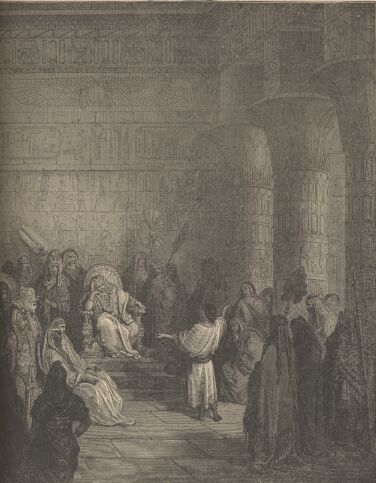
And it came to pass at the end of two full years, that Pharaoh dreamed: and, behold, he stood by the river. And, behold, there came up out of the river seven well favoured kine and fat-fleshed; and they fed in a meadow. And, behold, seven other kine came up after them out of the river, ill favoured and lean-fleshed; and stood by the other kine upon the brink of the river. And the ill favored and lean-fleshed kine did eat up the seven well favoured and fat kine. So Pharaoh awoke.
And he slept and dreamed the second time: and, behold, seven ears of corn came up upon one stalk, rank and good. And, behold, seven thin ears and blasted with the east wind sprung up after them. And the seven thin ears devoured the seven rank and full ears. And Pharaoh awoke, and, behold, it was a dream.
And it came to pass in the morning that his spirit was troubled; and he sent and called for all the magicians of Egypt, and all the wise men thereof: and Pharaoh told them his dream; but there was none that could interpret them unto Pharaoh.
[At the suggestion of his chief butler Pharaoh sends for Joseph and relates to him his dreams, which Joseph interprets as follows:]
And Joseph said unto Pharaoh, The dream of Pharaoh is one: God hath shewed Pharaoh what he is about to do. The seven good kine are seven years; and the seven good ears are seven years: the dream is one. And the seven thin and ill favoured kine that came up after them are seven years; and the seven empty ears blasted with the east wind shall be seven years of famine. This is the thing which I have spoken unto Pharaoh: What God is about to do he sheweth unto Pharaoh. Behold, there come seven years of great plenty throughout all the land of Egypt: And there shall arise after them seven years of famine; and all the plenty shall be forgotten in the land of Egypt; and the famine shall consume the land; and the plenty shall not be known in the land by reason of that famine following; for it shall be very grievous. And for that the dream was doubled unto Pharaoh twice it is because the thing is established by God, and God will shortly bring it to pass.
Now therefore let Pharaoh look out a man discreet and wise, and set him over the land of Egypt. Let Pharaoh do this, and let him appoint officers over the land, and take up the fifth part of the land of Egypt in the seven plenteous years. And let them gather all the food of those good years that come, and lay up corn under the hand of Pharaoh, and let them keep food in the cities. And that food shall be for store to the land against the seven years of famine, which shall be in the land of Egypt; that the land perish not through the famine.—Genesis xli. 1-36.
JOSEPH MAKING HIMSELF KNOWN TO HIS BRETHREN.
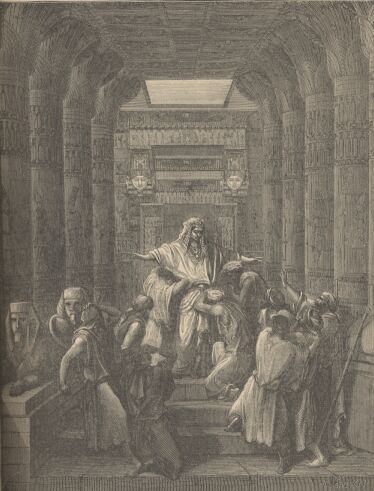
Then Joseph could not refrain himself before all them that stood by him; and he cried, Cause every man to go out from me. And there stood no man with him, while Joseph made himself known unto his brethren. And he wept aloud: and the Egyptians and the house of Pharaoh heard.
And Joseph said unto his brethren, I am Joseph; doth my father yet live? And his brethren could not answer him; for they were troubled at his presence. And Joseph said unto his brethren, Come near to me, I pray you. And they came near. And he said, I am Joseph your brother, whom ye sold into Egypt. Now therefore be not grieved, nor angry with yourselves, that ye sold me hither: for God did send me before you to preserve life. For these two years hath the famine been in the land: and yet there are five years, in which there shall neither be earing nor harvest. And God sent me before you to preserve you a posterity in the earth, and to save your lives by a great deliverance. So now it was not you that sent me hither, but God: and he hath made me a father to Pharaoh, and lord of all his house, and a ruler throughout all the land of Egypt. Haste ye, and go up to my father, and say unto him, Thus saith thy son Joseph, God hath made me lord of all Egypt: come down unto me, tarry not: And thou shalt dwell in the land of Goshen, and thou shalt be near unto me, thou, and thy children, and thy children's children, and thy flocks, and thy herds, and all that thou hast. And there will I nourish thee; for yet there are five years of famine; lest thou, and thy household, and all that thou hast, come to poverty. And, behold, your eyes see, and the eyes of my brother Benjamin, that it is my mouth that speaketh unto you. And ye shall tell my father of all my glory in Egypt, and of all that ye have seen; and ye shall haste and bring down my father hither.
And he fell upon his brother Benjamin's neck, and wept; and Benjamin wept upon his neck. Moreover he kissed all his brethren, and wept upon them: and after that his brethren talked with him.
And the fame thereof was heard in Pharaoh's house, saying, Joseph's brethren are come and it pleased Pharaoh well, and his servants.
And Pharaoh said unto Joseph, say unto thy brethren, This do ye; lade your beasts, and go, get you unto the land of Canaan; and take your father and your households, and come unto me: and I will give you the good of the land of Egypt, and ye shall eat the fat of the land.—Genesis xlv, 1-18.
MOSES IN THE BULRUSHES.
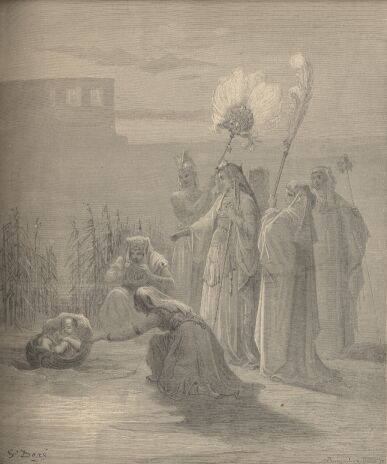
And there went a man of the house of Levi, and took to wife a daughter of Levi. And the woman conceived, and bare a son: and when she saw him that he was a goodly child, she hid him three months. And when she could not longer hide him, she took for him an ark of bulrushes, and daubed it with slime and with pitch, and put the child therein; and she laid it in the flags by the river's brink. And his sister stood afar off, to wit what would be done to him.
And the daughter of Pharaoh came down to wash herself at the river; and her maidens walked along by the river's side; and when she saw the ark among the flags, she sent her maid to fetch it. And when she had opened it, she saw the child: and, behold, the babe wept. And she had compassion on him, and said, This is one of the Hebrews' children. Then said his sister to Pharaoh's daughter, Shall I go and call to thee a nurse of the Hebrew women, that she may nurse the child for thee? And Pharaoh's daughter said to her, Go. And the maid went and called the child's mother. And Pharaoh's daughter said unto her, Take this child away, and nurse it for me, and I will give thee thy wages. And the woman took the child and nursed it.
And the child grew, and she brought him unto Pharaoh's daughter, and he became her son. And she called his name Moses: and she said, Because I drew him out of the water.—Exodus ii, 1-10.
THE WAR AGAINST GIBEON.
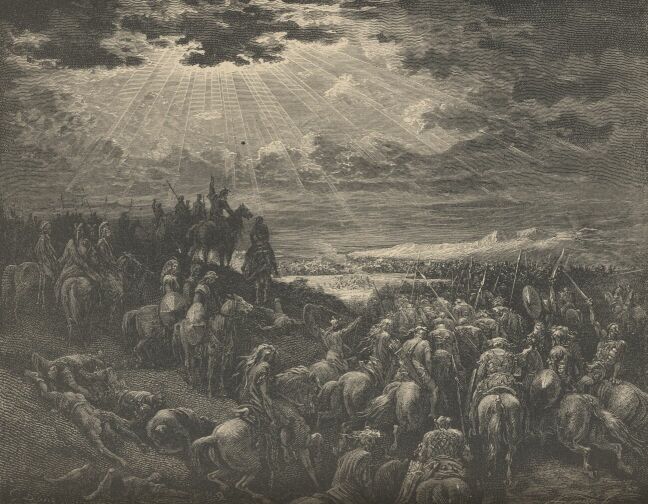
Therefore the five kings of the Amorites, the king of Jerusalem, the king of Hebron, the king of Jarmuth, the king of Lachish, the king of Eglon, gathered themselves together, and went up, they and all their hosts, and encamped before Gibeon, and made war against it.
And the men of Gibeon sent unto Joshua to the camp to Gilgal, saying, Slack not thy hand from thy servants; come up to us quickly, and save us and help us: for all the kings of the Amorites that dwell in the mountains are gathered together against us.
So Joshua ascended from Gilgal, he, and all the people of war with him, and all the mighty men of valor. And the Lord said unto Joshua, Fear them not: for I have delivered them into thine hand; there shall not a man of them stand before thee. Joshua therefore came unto them suddenly, and went up from Gilgal all night. And the Lord discomfited them before Israel, and slew them with a great slaughter at Gibeon, and chased them along the way that goeth up to Beth-horon, and smote them to Azekah, and unto Makkedah. And it came to pass, as they fled from before Israel, and were in the going down to Beth-horon, that the Lord cast down great stones from heaven upon them unto Azekah, and they died: they were more which died with hailstones than they whom the children of Israel slew with the sword.
Then spake Joshua to the Lord in the day when the Lord delivered up the Amorites before the children of Israel, and he said in the sight of Israel, Sun, stand thou still upon Gibeon; and thou, Moon, in the valley of Ajalon. And the sun stood still, and the moon stayed, until the people had avenged themselves upon their enemies. Is not this written in the book of Jasher? So the sun stood still in the midst of heaven, and hastened not to go down about a whole day. And there was no day like that before it or after it, that the Lord hearkened unto the voice of a man: for the Lord fought for Israel.
And Joshua returned, and all Israel with him, unto the camp to Gilgal. But these five kings fled, and hid themselves in a cave at Makkedah. And it was told Joshua, saying, The five kings are found hid in a cave at Makkedah. And Joshua said, Roll great stones upon the mouth of the cave, and set men by it for to keep them: and stay ye not, but pursue after your enemies, and smite the hindmost of them; suffer them not to enter into their cities; for the Lord your God hath delivered them into your hand.
And it came to pass, when Joshua and the children of Israel had made an end of slaying them with a very great slaughter, till they were consumed, that the rest which remained of them entered into fenced cities. Joshua x, 5-20.
SISERA SLAIN BY JAEL.
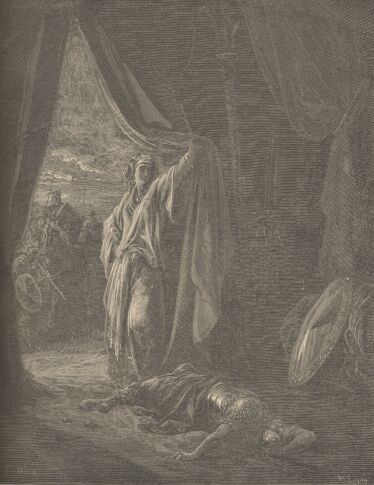
Now Heber the Kenite, which was of the children of Hobab, the father-in-law of Moses, had severed himself from the Kenites, and pitched his tent unto the plain of Zaanaim, which is by Kedesh.
And they shewed Sisera that Barak, the son of Abinoam, was gone up to Mount Tabor. And Sisera gathered together all his chariots, even nine hundred chariots of iron, and all the people that were with him, from Harosheth of the Gentiles unto the river of Kishon.
And Deborah said unto Barak, Up; for this is the day in which the Lord hath delivered Sisera into thine hand: is not the Lord gone out before thee? So Barak went down from Mount Tabor, and ten thousand men after him.
And the Lord discomfited Sisera, and all his chariots and all his host, with the edge of the sword before Barak; so that Sisera lighted down off his chariot, and fled away on his feet. But Barak pursued after the chariots, and after the host, unto Harosheth of the Gentiles: and all the host of Sisera fell upon the edge of the sword; and there was not a man left.
Howbeit Sisera fled away on his feet to the tent of Jael, the wife of Heber the Kenite; for there was peace between Jabin the king of Hazor and the house of Heber the Kenite. And Jael went out to meet Sisera, and said unto him, Turn in, my lord, turn in to me; fear not. And when he had turned in unto her into the tent, she covered him with a mantle. And he said unto her, Give me, I pray thee, a little water to drink; for I am thirsty. And she opened a bottle of milk, and gave him drink, and covered him. Again he said unto her, Stand in the door of the tent, and it shall be, when any man doth come and enquire of thee, and say, Is there any man here? that thou shalt say, No. Then Jael, Heber's wife, took a nail of the tent, and took an hammer in her hand, and went softly unto him, and smote the nail into his temples, and fastened it into the ground: for he was fast asleep and weary. So he died.
And, behold, as Barak pursued Sisera, Jael came out to meet him, and said unto him, Come, and I will show thee the man whom thou seekest. And when he came into her tent, behold, Sisera lay dead, and the nail was in his temples. Judges iv, 2-22.
| Previous Part | Main Index | Next Part |
The Gallery of Dore Illustrations
We are proud to present a gallery of the best illustrations of Gustave Dore. There are two ways to enjoy the illustrations. The first is by browsing our image gallery. The second is to view the drawings in context, as part of the books which they illustrated. To that end we have posted the texts ofThe Bible The Divine Comedy Gargantua and Pantagruel, Gustave Dore Caricatures--Two Hundred Sketches